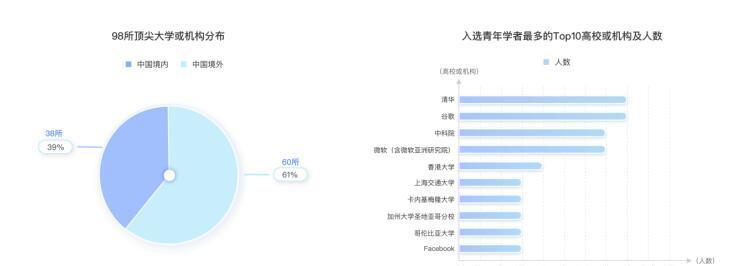On April 28, 2022, the world's first list of AI Chinese young scholars was officially announced. The list selects 150 Chinese young people who have made outstanding contributions in the field of AI from all over the world, and their research directions focus on academic and industrial hotspots, covering cutting-edge hot fields such as autonomous driving, quantum computing, dialogue systems, and biological computing, of which 70% of the finalists are engaged in academic research in universities.
The list is jointly released by Baidu Talent Think Tank (TIC), Baidu Academic, Tianjin University Complex Management System Laboratory, and Business Intelligence Center of China Academy of Science and Technology. The selection of the AI Young Chinese Scholars List aims to encourage young scholars in artificial intelligence and its intersectional fields to make more influential achievements and explore young Chinese technology leaders who are both "thick" and "high".

In 2021, Baidu released the first list of the top 100 AI Chinese rising stars, which is aimed at the Chinese students in the AI field who are studying all over the world, and 100 outstanding young students are selected from the four fields of computer vision, machine learning, natural language processing, and data mining. This year's AI Chinese Young Scholars List is composed of two parts: the AI Chinese Young Scholars List (classic field) and the AI Chinese Young Scholars List (AI+X), based on 186963 papers and 89324 scholars' data, from the three dimensions of academic level, academic influence and academic potential index, using big data mining technology, 100 high-potential young scholars who are active in the classical AI field and 50 who are active in the AI intersection field are selected.
According to reports, the 150 AI Young Chinese Scholars shortlisted for the list are from 98 top universities or institutions around the world, of which 38 are from universities or institutions in China, accounting for 39%. In this list, the top 10 universities or institutions with the most young scholars are Tsinghua University (8 people), Google (8 people), Chinese Academy of Sciences (7 people), Microsoft (including Microsoft Research Asia, 7 people), University of Hong Kong (4 people), Shanghai Jiao Tong University (3 people), Carnegie Mellon University (3 people), University of California San Diego (3 people), Columbia University (3 people), Facebook (3 people).
According to the list, 70% of the finalists continue to focus on scientific and academic related research work after graduation. Through the research of AI talents in the past 10 years, it is found that with the continuous improvement of academic directions, the age structure of talents is also changing, showing a trend of rejuvenation.
Taking the young scholars in the scope of this inventory as an example, the proportion of scholars graduated in 2017 is the largest, nearly 30%; the proportion of scholars who graduated in 2019 and later accounts for nearly 30%, of which two scholars focusing on data mining and natural language processing are in the reading stage, but they have also produced significant results in their respective fields and have great development potential. The age structure of talents is constantly evolving towards rejuvenation, which plays a very important role in the research and improvement of the academic field.
Different from the classic field, the AI intersection focuses more on the application of artificial intelligence technology in specific scenarios, such as robotics, autonomous driving, bioinformatics, AI security, Internet of Things, urban computing and many other different research directions.
Artificial intelligence as the key development direction of the national strategy, the mining and cultivation of talents is crucial. In recent years, Baidu has actively laid out the AI talent training ecosystem, and continued to invest in AI basic courses, practical teaching, technical competitions, industrial practical training, and scientific research funds. At present, Baidu has cultivated nearly 2 million AI talents for the society, and will continue to increase investment in the future to achieve the goal of cultivating 5 million AI talents for the society around learning, employment, certification, practice, competitions and other links.
In addition, Baidu has also set up various scholarships to fund AI young scholars, such as Baidu Scholarship and Baidu Pine cone program. It is believed that young scholars can bring new impetus to the development of artificial intelligence, and will also bring more convenience and intelligence to life.
Upstream journalist Yang Ye intern Liu Jin